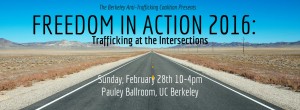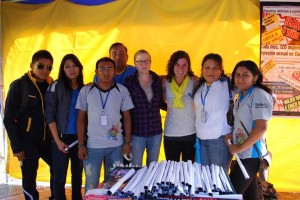By Sarah Bernardo
At a university with a long, illustrious history of social activism, it is easy for students to feel overwhelmed by the sheer number of movements and awareness campaigns being waged on the UC Berkeley campus. Certain issues seem to fall through the cracks. A dedicated group of Cal students is working hard to make sure that human trafficking does not become one of those overlooked issues.
According to Apurva Govande, the Co-President of the Anti-Trafficking Coalition at Berkeley, sex trafficking, child labor, forced labor, and bonded labor are not isolated issues, but “human issues” that touch every aspect of our daily lives from the clothes we wear to the food we eat.
While the anti-human trafficking community at Cal is small, interest in the issue has been growing rapidly. The Anti-Trafficking Coalition is taking a big step to grow awareness on trafficking and modern slavery by hosting their second “Freedom in Action” conference this Spring (on Sunday, February 28).

The conference is open to everyone, and this year’s theme is “Trafficking at the Intersections.” According to Kathy Brasil, the Coalition’s Publicity Chair, “we will be exploring many nuances of slavery and freedom through a keynote address from survivor and Cal alum Minh Dang as well as a number of unique workshops.” Dang is the founder of the Minh Dang Fellowship for Human Rights which focuses on the eradication of all forms of modern slavery. (The application for the fellowship is open to all UC Berkeley students, and one student is selected each year to serve as a Dang Fellow.)
Govande said, “As student abolitionists, we can often make a much greater difference than we realize. Just being aware of the issue can catalyze change for the people behind the issue: the men, women, and children that human trafficking directly affects.”
Dedicated anti-trafficking activists at Cal have been busy developing programs like the Human Trafficking Prevention Education DeCAL, which Govande says “does a great job of familiarizing students with the issue and brings in speakers each week that highlight different aspects of human trafficking.”
The Anti-Human Trafficking IdeaLab is another result of activist efforts. The IdeaLab is a multidisciplinary think tank that brings together students, academics, and community partners to tackle human trafficking. Their aim is to analyze the intersecting social issues that contribute to modern slavery and to present best practices for combating the issue at its source. No particular experience is necessary, so anyone with an interest in human trafficking is encouraged to join the IdeaLab.
This Spring at the Blum Center, world-renowned anti-trafficking activist and expert Siddharth Kara is teaching Global Poverty & Practice 140, “Human Trafficking and Modern Slavery.” (Read our interview with Kara here.) GPP 140 is an eight week course that examines various modes of exploitation within numerous contextual frames such as economics, culture, and history.
The renewed energy and attention on trafficking got a huge boost at Cal in 2013 when the Student Abolitionist Movement, the UC Berkeley chapter of the International Justice Mission, and Not For Sale combined to form the Anti-Trafficking Coalition at Berkeley. Brasil describes the coalition as a “student-run organization that focuses on educating students, raising awareness in the community, and advocating for more effective legislation in order to eliminate human trafficking in the Bay Area and beyond.”
Although the Human Trafficking Prevention DeCAL and GPP 140 are indications of increased awareness and interest, Russell Wilson, a former member of the Student Abolitionist Movement and advisor to the Coalition, says, “I would like to see more DeCALs as well as actual full credit classes taught on human trafficking. One thing that would be good is if a department such as the Social Welfare department would hire a person with both an academic and anti-trafficking background to create a curriculum around human trafficking.”
The “Trafficking at the Intersections” conference will feature a host of events to engage people who are new to the issues of human trafficking, as well as seasoned activists. Twenty different workshops will be offered, covering a range of topics including “Human Trafficking and the Superbowl Myth,” “Healing Through the Expressive Arts,” and “The Intersection of School-to-Prison Pipelines and Human Trafficking.” Legal professionals and academics such as Alameda County’s Deputy District Attorney Sabrina Farrell; Director of the Boalt School of Law Anti-Trafficking Project Alynia Phillips; and Federal Administrative Judge Marianna Warmee will be leading workshops. Representatives from non-governmental organizations, arts groups, and religious communities like CEO of Breaking the Chains Debra Woods and Reverends Amy Zucker Morgenstern and Debora Pembrook from the Unitarian Universalist Abolitionists will also host sessions.
In whatever way individuals choose to join the anti-trafficking community at Cal, they will be met with passionate and driven advocates. Govande, Wilson, and Brasil emphasize that the reason to become a part of this movement is that human trafficking is something that affects us all.
How Can You Get Involved?
Freedom in Action Conference 2016: Trafficking at the Intersections
Sunday, February 28 from 9:00 am to 4:00 pm
Grand Pauley Ballroom at UC Berkeley
The Anti-Trafficking Coalition at Berkeley meets every Monday 7:00 pm to 8:00 pm in 175 Barrows
Human Trafficking Prevention Decal





